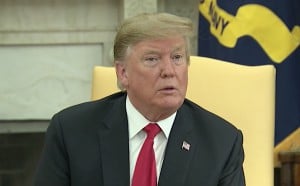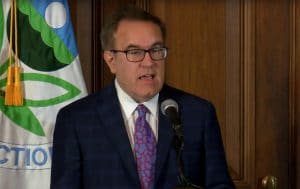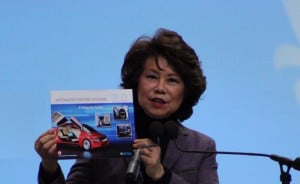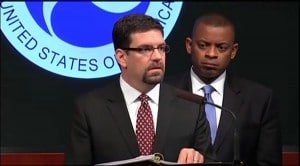
President Donald Trump rolled back the fuel economy standards established during the Obama administration.
The White House on Tuesday formalized plans to roll back fuel economy standards set during the Obama administration, a move expected to substantially lower the mileage the typical new vehicle will deliver by 2025.
What the administration is calling the “Safer Affordable Fuel-Efficient (SAFE) Vehicles Rule” will require a 1.5% increase in each manufacturer’s average mileage from the 2021 through 2026 model years. That is more than the original plan outlined two years ago. But it means that, in real-world terms, the typical vehicle will only be required to achieve 40.4 miles per gallon by 2025, compared with the Obama-era target of 46.7 mpg.
Administration officials acknowledged their original proposal had received widespread criticism from environmental and consumers groups, with only tepid support from the auto industry. But they relied on the same arguments to justify the final rollback of the Corporate Average Fuel Economy, or CAFE, standards, EPA Administrator Andrew Wheeler claiming the move “will get more Americans into newer, cleaner, safer vehicles” than would have been the case with the original mileage rules.
(White House set to reveal final fuel economy rollback.)
During an hour-long teleconference, officials from the EPA and the Department of Transportation – the agencies that jointly regulate U.S. fuel economy standards – pointed out that things have changed significantly since 2012, when the Obama mileage mandate was enacted. Fuel prices have not risen as expected, they noted, while the American market has largely shifted from small, high-mileage passenger cars to less efficient SUVs, pickups and other light trucks.

EPA Admin Andrew Wheeler claims the rollback will get more Americans into safer, more fuel efficient cars than the previous standards.
At the same time, new vehicle prices have surged to an average $38,000, said James Owen, acting administrator of the National Highway Traffic Safety Administration. That puts, many motorists at risk, he claimed, by switching from new to used vehicles that are less safe. The analysis run by the administration claims the rollback will save 3,300 lives through 2029, avoid 397,000 injuries and prevent 46,000 hospitalizations.
Meanwhile, by lowering the cost of technology needed to boost fuel economy, the analysis claims that will lower the total cost of ownership of a new vehicle by $1,400, Owens suggesting that is money that could be used to pay for college or help purchase a new home.
“We believe, on balance, this is the right compromise, this is the right balance to strike for the country,” the acting NHTSA chief said during the conference call.
The modified CAFE rollback received more positive feedback than the original mileage freeze floated in 2018, both from the auto industry and other business groups.

Transportation Secretary Elaine Chao unveiled the SAFE vehicles rule, rolling back Corporate Average Fuel Economy levels to current levels.
“The Administration’s final rule released today appears to have struck this balance by providing a workable path forward on a unified national program that provides regulatory certainty while strengthening fuel economy standards and continuing emissions reductions,” said Marty Durbin, president of the U.S. Chamber’s Global Energy Institute.
But criticism was sharp and fast forthcoming from consumer and environmental groups, as well as opponents in Congress. Some pointed to the ongoing coronavirus pandemic which has had a particularly harsh impact on those with existing medical problems such as asthma.
The proposal is “the height of irresponsibility for this administration to finalize a rollback that will lead to dirtier air while our country is working around the clock to respond to a respiratory pandemic whose effects may be exacerbated by air pollution,” said Sen. Tom Carper, a Delaware Democrat and member of the Senate Environmental Public Works Committee.
(EPA, NHTSA submit final fuel economy proposals to Trump.)
Even without considering the coronavirus outbreak, the higher level of pollution created by lower fuel economy will result in the deaths of up to 10,000 American by 2035, said Paul Billings, the national director of public policy for the American Lung Association.

Consumer Reports’ David Friedman said that consumer costs will rise under the new standards, even with gas prices as low as they are now.
Separately, the cost analysis by the DOT and EPA came under sharp criticism. If anything, Consumer Reports estimated the new rules will cost American motorists an additional $300 billion through the end of the decade — David Friedman, the non-profit group’s vice president of advocacy, arguing that, even at current fuel costs, the revised CAFE mandate will cost, rather than save, consumers money. Friedman is also a former deputy administrator and action administrator of NHTSA.
The auto industry originally supported the Obama-era mileage compromise but the industry began to call for a rollback mid-decade as market demand shifted to light trucks. The outgoing president declined to order any changes, but new President Donald Trump quickly said he would order a cut in CAFE.
The original, 2018 proposal was quickly shot down and the administration went to work on a less drastic reduction. Then, last year, the White House announced it would strip California of its ability to set separate carbon dioxide emissions standards — something that translated into the ability to set mileage rules even higher than what was in the national mandate.
That move is now tied up in the courts and the case could drag on for some time, according to legal observers, in part due to impact of social distancing rules caused by the current pandemic.
During the DOT/EPA teleconference, NHTSA chief Owens was asked whether politics influenced the final CAFE rules.
“This is not political,” he insisted “This is policy. This is a technical exercise and we think we’ve struck the right balance for everybody.”
As to the possibility of further legal challenges, Owens said he hoped that wouldn’t happen but added that the administration is ready to defend its position in court.
(Trump confirms mileage standards cut, elimination of California clean air waiver.)
What really might matter most is how the auto industry responds. Several senior officials, on background, have said they either don’t plan to change strategies on mileage or will, at the least, wait to see what happens in court. They will also be watching to see what happens in November, as a Democratic president is generally seen as unlikely to let the rollback of federal mileage standards go ahead.

